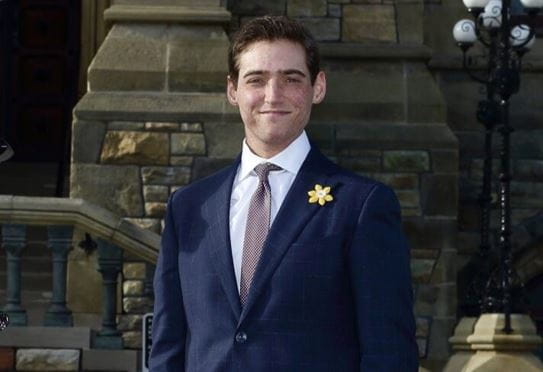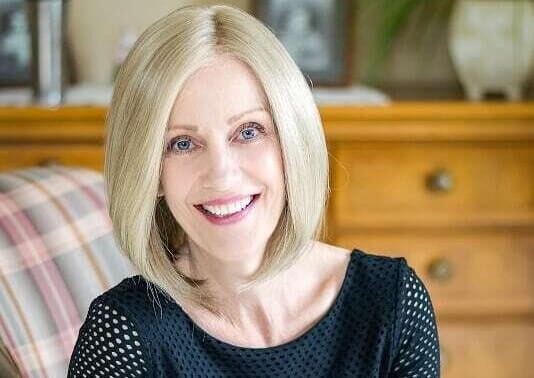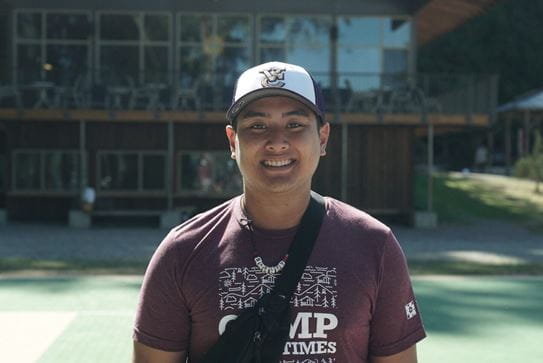Life with cancer is complex – for those living with a diagnosis, as well as those caring for them. For many people, accessing cancer care often comes with financial hardships.
Closing the cancer care gap requires collective action.
Our purpose at the Canadian Cancer Society (CCS) is to unite and inspire all Canadians to take control of cancer through advocacy, fundraising and volunteering. Meet Dylan, Julie and Bailey – 3 cancer survivors who advocate for unified action to improve the lives of people living with cancer.
Dylan's story: From a cancer diagnosis to advocacy
Dylan was in his second year of university when he found a lump on his neck. In March 2017, he was diagnosed with Hodgkins Lymphoma. He began treatment right away, starting with chemotherapy, then radiation. The side effects were very challenging.
3 months into chemotherapy, Dylan felt like he was at his lowest. But when he sat down for treatment, he met an elderly woman who changed his perspective. Dylan learned that her prognosis wasn’t as good as his and she didn’t have a support system made up of a caring family and friends like him.
“[She] was just the opposite of me; she was bright, joyful, energetic, and talked to everyone who would listen,” Dylan said. “It stuck with me that this woman had so much less than me but was able to spread so much joy and positivity. It changed my mindset, and I was able to push through the rest of my treatment.”
From then on, Dylan dedicated himself to advocacy. Not long after he completed his treatment, Dylan started speaking at schools about his experiences with his diagnoses and treatment. He also got involved with Relay For Life, even organizing the event at Queen’s University.
“I had mixed feelings putting on that yellow survivor shirt for the first time,” said Dylan. “Dealing with a cancer diagnosis and being vulnerable and open about your mental and physical health can be difficult, so it was a big step for me, but it was also an opportunity to find a fantastic community of people who were just there to support one another, share their experiences and build each other up.”
After graduating university, Dylan began working at the Canadian Cancer Society, where he helps volunteers across Canada organize their own Relay For Life events. Dylan has been cancer-free since January 2022 and continues his fundraising and advocacy work, emphasizing the impact that volunteering and fundraising make.
When asked what he would say to volunteers who support CCS support programs, Dylan said:
The work that you're doing is affecting people living with cancer just like me, and you're making a real impact every day. Thank you feels too short but thank you for your amazing work! So much of what we do is staff-supported and volunteer-led, so it is only possible with our volunteers.

Julie's story: Fundraising for research
Breast cancer is familiar to Julie Booker and her family. In 1980, Julie and her sisters lost their mother to breast cancer. In 2011, one of her sisters was diagnosed with breast cancer. Later the same year, Julie herself learned that she had 4 tumours and was diagnosed with breast cancer.
“I didn’t let cancer become me. I wasn’t cancer. I was still Mom. I was still Julie,” she said.
Julie shares her story in the hope it will help others. In 2018, she became the face of the Canadian Cancer Society CIBC Run for the Cure, joined by her husband and daughter. She also volunteered with the Canadian Cancer Society wig salon.
Fundraising events like the CIBC Run for the Cure are of vital importance because they help make a difference. If we didn’t have events like the Run, we couldn’t fundraise for the research to help eradicate breast cancer.

Bailey's story: Giving back through volunteering
Bailey was only 9 years old when he was diagnosed with leukemia. It was a difficult time for him and his family but in the summer of 2006, they decided to visit Camp Goodtimes. Camp let Bailey and his family connect with other people who understood what they were going through.
Bailey looked up to the Camp Goodtimes volunteers who were dedicated to creating good memories for everyone. Once he was older, he knew he wanted to give back. Now healthy and in his 20s, Bailey has regularly volunteered at Camp Goodtimes and joined the Canadian Cancer Society staff in 2022.
“It’s amazing to be on the other side of things and be there for these kids and give back. I can’t get enough of it,” Bailey said. “I’ve known some of these kids since they were 12 or 13 and now, they’re young adults getting ready to go to college. It’s really special to see how much they’ve grown because of programs like Camp Goodtimes, and what an impact it has had on their lives and their cancer journeys.”
Bailey hopes that programs like Camp Goodtimes will continue to make a difference in the lives of children affected by cancer and their families for a long time. Thanks to the support of generous donors from across the country, hundreds of kids each year can attend camp and create much-needed connections with each other.
The impact these programs have on the lives of these kids is super important. It really helps in their development through treatment, as a young teenager and into adulthood. When I see someone from camp who I knew from when I was a camper, it’s a special experience to reconnect and reflect on the memories we made. These moments are only possible thanks to donors.

The cost of cancer
While a cancer diagnosis comes with physical, emotional and mental health needs, it also often comes with financial burdens. Each month, people in Canada spend an average of $260 on out-of-pocket costs such as medications, caregiver expenses, and transportation to appointments. And for underserved populations, like people living in rural and remote communities and families caring for young children facing cancer, the costs can be even greater.
A recent CCS poll found that 90% of people in Canada feel a sudden cancer diagnosis would impact their household finances and 30% said they would go into debt to pay for out-of-pocket costs.
The Canadian Cancer Society helps people access the care they need without financial hardship. Our volunteer drivers travel over 8.2 million kilometres each year to drive people to and from their cancer-related appointments. We also provide accommodations at our lodges for people receiving life-saving cancer treatment. For free mental health support, people can use our resources, such as cancerconnection.ca, as a safe space to share their experiences.
Help close the care gap
Nothing gets solved by one person. It takes a society to make an impact and create progress for better treatments, better care and better support.
February 4 marks World Cancer Day, a global call for support to raise awareness, improve education and take personal, collective and government action to save lives and ensure cancer care is equitable to all. You can make a difference and help close the care gap.
This World Cancer Day, we’re asking everyone to join us in calling on governments across Canada to help make cancer care more affordable. We will be hand delivering a letter to the Minister of Health in April to call for a change. Add your name to the letter today to help close the care gap.
